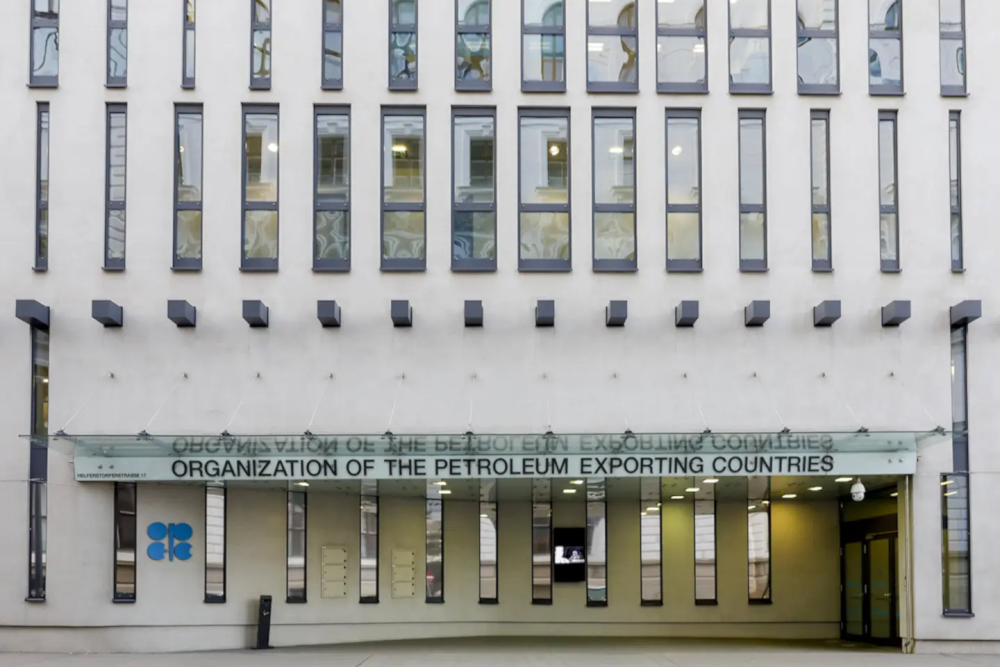OPEC+ set to approve larger-than-expected oil supply increase
OPEC+ plans a major production boost as Saudi Arabia pushes to restore halted supply, aiming to meet summer demand while risking a deeper global oil glut.
-

The logo of the Organization of the Petroleum Exporting Countries (OPEC) is seen outside of OPEC’s headquarters in Vienna, Austria, March 3, 2022 (AP)
OPEC+ is preparing to approve a larger-than-expected increase in oil production next month, signaling a decisive shift away from years of output restraint despite mounting fears of a global oversupply, Bloomberg reported.
According to delegates familiar with the matter, the alliance, led by Saudi Arabia and including Russia, plans to boost output by approximately 550,000 barrels per day at a virtual meeting scheduled for Saturday. The move surpasses the group’s previously planned hikes of 411,000 barrels per day for May, June, and July.
The planned August increase marks a significant pivot for OPEC+, which has surprised markets since April by ramping up production more aggressively than anticipated. The shift comes at a time of high global inventory levels and slowing demand growth, especially from China, raising questions about the group’s long-term strategy.
OPEC+ eyes output hike as Saudi Arabia pushes to restore supply
One delegate told reporters the accelerated production ramp-up aims to “take advantage of stronger demand” during the northern hemisphere’s summer months. The group is also under pressure to reclaim lost market share, particularly from US shale producers, and to enforce discipline among members that have exceeded their quotas in recent months.
Officials cite multiple reasons for the strategic shift, including the need to meet peak seasonal demand, enforce compliance among members exceeding their output quotas, and expedite the return of previously offline production. Saudi Arabia, in particular, is reportedly pushing to restore withheld barrels as swiftly as possible.
If approved, the planned hike would bring OPEC+ significantly closer to reinstating 2.2 million barrels per day of suspended output by September. Another similar increase may be considered for the following month, with potential production targets for September also expected to be on the meeting agenda.
However, the actual increase in supply may be less than headline figures suggest. Past hikes have been undermined by underproduction, as some members, including Saudi Arabia, have pressured others to "compensate" for previous overproduction. Kazakhstan, in particular, has continued to pump well above its assigned quota.
Saudi Energy Minister Prince Abdulaziz bin Salman has reportedly led efforts to enforce compliance while navigating internal tensions within the alliance.
Implications for the market, White House
Traders had largely anticipated another 411,000-barrel increase in August, matching the last three months. Early internal discussions also centered on that figure, according to a report by Bloomberg.
The surprise increase could be welcomed by US President Donald Trump, who has been pressing OPEC+ to increase output in an effort to lower oil prices, cool inflation, and support consumer spending ahead of the 2025 election. Lower prices could also strengthen Trump’s hand in persuading the Federal Reserve to consider interest rate cuts.
Yet the supply boost could exacerbate what many analysts now describe as an emerging global oil glut. According to the International Energy Agency (IEA), oil inventories have been expanding by roughly 1 million barrels per day, driven by weak Chinese demand and rising production from the US, Brazil, Canada, and Guyana.
Oil prices under pressure
Analysts at Goldman Sachs and JPMorgan Chase forecast that prices could drop to $60 per barrel or lower by the fourth quarter. That scenario presents a significant challenge for Saudi Arabia, which is already grappling with a growing budget deficit. Falling oil revenues threaten to delay or downsize Crown Prince Mohammed bin Salman’s Vision 2030 infrastructure projects.
Meanwhile, Russia, OPEC+’s key partner, faces a worsening economic outlook. Moscow is contending with financial sanctions, banking instability, and declining energy revenues.
The price downturn is also hitting US producers. A recent industry survey revealed that many US shale firms plan to cut back on drilling new wells, citing uncertainty over oil prices and the impact of Trump’s ongoing trade war.

 4 Min Read
4 Min Read










